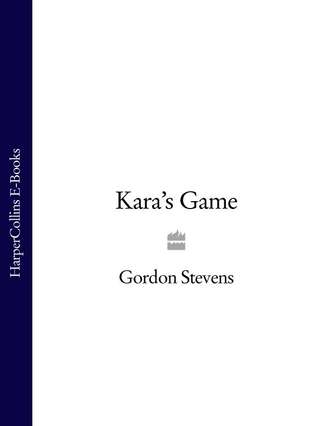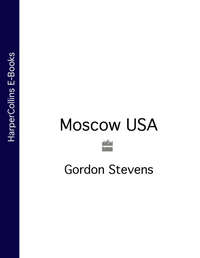
Полная версия
Kara’s Game
The woman nodded, stamped the three cards to indicate they had received their food for that day, and nodded for them to move forward.
The beans were bubbling in the vat. Another woman ladled her two helpings, and the third passed her two slices of rough white bread.
‘Three helpings,’ she told them. ‘My husband’s back from the front today.’
The beans were white, without taste. She smiled her thanks, jammed the lid firmly on, put the bread in the plastic bag she’d carried in her pocket, and left. Outside it was snowing slightly more heavily. Thank God there was no sniper today, thank God she wouldn’t have to run across the bridge.
MacFarlane saw her coming. It was funny how you remembered certain people, certain faces. Perhaps it was the child she was carrying or the way she was carrying him, perhaps the way she’d run across the bridge earlier. He smiled at her as she passed and watched as she approached the bridge.
Any more snow and he’d begin losing visibility, Valeschov thought. Christ it was cold. He held the Dragunov carefully, so it did not touch his face. A couple of hours to go, then he’d be off to the village two kilometres away for forty-eight hours’ R and R. He peered down the sights and picked up the bridge. There were two places where the targets were soft and easy: the first was the bridge and the second was the street running from the school into the new town, parallel to the river and some hundred metres from it. Sniper Alley the locals would call it, and if they didn’t they should.
No midday shelling today, so something was up. Not that they’d tell him, he’d be the last to know. Probably leave him up here to freeze his balls off unless he made sure they remembered him. The snow was heavier and the darkness was closing in, even though it was still early afternoon. He flicked the safety on and blew the snowflakes away from the sights. Christ it was even colder. He settled again and picked up the bridge. Someone was about to cross – it was strange how you could pick it up, almost smell the fear. Which direction, though, old town to new, or new town to old? Probably the latter.
New town to old – he saw the figure. Go for the first and not get lined up properly, or wait and hope there was a second? Perhaps just let off a few rounds and laugh at the way the bastards danced.
Thank God there was no sniper, Kara thought, thank God she didn’t have to risk spilling the soup. She called it soup because it sounded better; when she and Jovan got home perhaps she’d add a few herbs she’d saved from the summer, make it taste better, at least make it taste of something. God she was cold, God how little Jovan’s face was white and stiff. Please may Adin be okay, please may he make it home tonight.
Somebody didn’t know he was there – Valeschov flicked off the safety. Somebody was walking rather than running across the bridge. Somebody liked playing Russian roulette. Perhaps he’d take them in one, perhaps he’d put a shot near them first, scare the shit out of them before he finished them off.
The river below her was grey and the sky above was lost in the snow. Why wasn’t she running, she suddenly thought; why hadn’t she waited to cross the bridge with a group? At least Jovan was on her right, away from where the snipers normally were. Run, she told herself. Don’t run, because if you do you’ll lose your nerve for ever. What the hell are you talking about – she came back at herself. You’re on the bridge and even though there’s no sniper you’re in the open and exposed.
Take them now, Valeschov decided, it was too cold to be frigging about.
The swirl of snow closed round her, so she could no longer see even the end of the bridge. On the hillside above, Valeschov heard the crunch of footsteps behind him and turned.
‘We’re pulling out.’ The sergeant was wrapped against the cold, his face barely visible. ‘They’re sending up the big stuff.’
‘Thank Christ for that.’ Valeschov flicked on the safety and eased himself up. ‘Another hour and I’d have been a bloody snowman.’
Something was wrong. There had been no shells at midday, and no small-arms rounds that afternoon.
It was ten minutes to the time the Serbs on the hills above Maglaj began their late afternoon barrage – thirty rounds over a one-hour period, then more or less silence for the night.
MacFarlane swung the Nissan in a tight circle, drove to the dilapidated building next to the bank midway between the radio station and the school, and went to the ground floor of the block where the UNMO team had established its base.
The room was six metres by five, low ceiling and sparse furniture. The sleeping bags and American camp cots were against one wall, food and cooking items against a second, and a table and chairs in the centre. The windows were boarded against shrapnel, and the radio handset was on the table, coaxial wires running to the HF set mounted in the vehicle so they didn’t have to go outside to speak to Vitez.
Umbegi brewed a tea and they waited.
Jovan’s hands and face were cold. Kara closed the door, lit the candle, sat him by the stove and rubbed a semblance of warmth back into him. The semi-basement in which they now lived was crowded: the stove in the centre of the rear wall, the double bed to the right, which they also used as a sofa, and Jovan’s smaller bed – which he no longer slept in – to the left, the table in the middle with the wooden chairs round it, and the dresser against the left wall, on it the family photographs and the radio (connected to the bike, which you had to pedal to get the power). The only other furniture was an armchair to the left of the door.
At the beginning of the siege they had boarded the windows with planks and moved the rest of the furniture to the floor above, leaving the top level empty … At the beginning the water and electricity had stopped almost immediately, so now they made their own candles and got their water from the well in the garden … At the beginning …
How long ago that was.
Jovan was playing on the double bed with the wooden toys Adin had made him. Kara knelt in front of the stove, opened the fire door, and added a little more wood. Not too much – even though every summer she and Adin made sure they had enough for the winter she was careful now, unsure how long winter would last. The boy’s eyes stared at her through the halo of light round the wick of the candle. She poured his share of the beans into a saucepan, then half of her own. Perhaps it was caution, perhaps premonition, that she saved the rest. Then she cut half a potato and half a carrot into cubes and put them in. It was a luxury, but today they should celebrate; this afternoon Adin would be home from the front, even if only for a few hours, and today there had been no sniper waiting for her to cross the bridge.
Please God, may Adin be safe. Please may he really come home tonight. Please God, may this crazy war soon be over.
Outside it was dark.
At midday there had been no shells, and by now there should have been the late afternoon blitz, reminding them that the Serbs, the Chetniks as she called them, were on the hills above Maglaj and controlling everything that happened in it.
Perhaps that was it for today, Kara realized she was praying; perhaps the Chetniks had run out of shells, perhaps they were going away. Perhaps there really was a ceasefire.
Crazy war – the thought was more conscious this time.
First the Serbs had attacked the Croats and Muslims. Then, just under a year ago, the Croats had changed sides, and were now fighting with rather than against the Serbs. So villages and towns and areas were split. But even that was logical compared with what was really happening. Take the small pocket containing Maglaj and, fifteen kilometres to the north, Tesanj. The pocket was an island, isolated in Serb-held territory, with the main front line with Muslim-held Bosnia to the south. On the west, north and east sides of the pocket the Serbs were attacking them; to the south the attack was coming from a combined Serb and Croat army. But in Tesanj the local Croats and Muslims were fighting side by side against the Serbs.
Even the term Muslim was misleading. At first the world called me a Yugoslav, she remembered telling an aid worker once; then it called me a Bosnian, and now it calls me a Muslim. But I’ve never been inside a mosque, don’t even know how to pray. My mother’s mother, my grandmother, who lives in Travnik, is a Croat. And my husband’s grandfather, after whom we named our son, was a Serb.
She thought she heard the whine of the first shell or mortar, and froze. Braced herself for the impact then relaxed again. If there was such a word or notion as relaxing any more.
Don’t look at the photograph, she told herself, because it will only make you cry. Because of all those in the photograph apart from her and Adin and Jovan, only her Croat grandmother in Travnik was definitely alive. The others – her parents, Adin’s parents, their brothers and their sisters – had either been killed or had vanished in the ethnic cleansing by the Serbs or the bitter bloodletting between Croats and Muslims. Or perhaps they were alive, perhaps they had made it out and were in a refugee camp somewhere. Perhaps one day they would see each other again, take another photograph of the family happy and at peace with itself and the world.
Sometimes it was as if the West had abandoned her, had totally and cynically forgotten about her and the likes of her.
Forget it, she told herself; just concentrate on surviving today, don’t even think about tomorrow.
She made herself kneel again in front of the stove, made herself stir the beans. Made herself laugh at little Jovan as she poured his share into the small round plastic bowl, then poured the smaller portion she had allowed herself and broke a piece of bread for him.
Occasionally someone remembered, of course, occasionally a little aid got through.
The first time was before the siege proper had started. They had still been cut off and under fire, but some British soldiers had come. The Cheshires, she remembered the name of the regiment. Then there was the man with a beard from the UNHCR. And after that, when the days were short and dark and the cold and hunger were seeping into them all, the planes had come over and dropped food packages on to the town, but the wind had taken the food on to the hillsides. That night the people had gone out with torches, Adin among them, to search for the oh-so-precious packages. Even now she could remember standing in the doorway, little Jovan in her arms, pointing out the lights among the trees and laughing because it was like Christmas, seeing the lights moving in the dark as the people looked. Then the Chetniks had started to shell the wood, and the lights had scattered like fireflies on a summer night, and one by one had gone out as people ran or died.
There had been one more time the aid had come.
Adin was at home, so she had gone alone for the pan of beans. Had crossed the bridge and was scuttling towards the school when she had seen them. Four soldiers, but not as she had seen soldiers before. Not riding in tanks or jeeps like other soldiers, or like the UN monitors who’d come in to cover the so-called ceasefire. Combat clothes but no helmets or berets, big packs on their backs, radios on them, and all carrying guns. Always walking, always carrying everything they had with them. Always moving quickly.
The next day she had seen them again. Had heard them speak and spoken to them. And because she had spoken to them in English, because at university she had studied English, she always remembered them as English rather than British.
And because there was no one else, she had interpreted for them. Had picked up the word laser, and interpreted to the Red Cross about the planes and the food drops. That night, and for several nights after, the soldiers had disappeared into the woods; that night and for several nights after, the planes had come over and dropped the food exactly where the soldiers told them to. And the people had eaten. Then the soldiers had gone, and she had never known how they had come to Maglaj or how they had left or even who they were. Except that once she had asked them, and they had told her, but even then she had not understood.
‘Eat up.’ She wiped the bread round the bowl and made Jovan eat, spooned the beans into her own mouth and heard the swoosh.
Mortar, MacFarlane registered automatically. Incoming. An hour later than normal, but still more or less in line with the usual pattern.
Kara grabbed Jovan and pushed him under the bed, slid beside him.
Impact two hundred metres away, near the river bank of the old town – MacFarlane registered the fact automatically and entered it in his log.
Kara felt Jovan trembling and held him tight. Half an hour, perhaps an hour of hell, then it would be over till tomorrow.
Thirty seconds gone – MacFarlane didn’t need to check his watch. Almost a minute, closing on two. Incoming – he heard the whine, then the sound of impact. New town again, somewhere near the radio station. He waited another two minutes, perhaps slightly longer.
The incoming shell sounded like an express train. They’re trying to make us afraid, Kara told herself; they’ve allowed us to settle into a routine, now they’re changing it. The walls shook slightly as the round landed.
Old town, MacFarlane confirmed.
The half-hour stretched to forty-five minutes, then to an hour, an hour and a half, the shells and mortars still landing.
The Norwegian handed him a mug of tea, hot and sweet, and crouched beside him.
‘What’s up?’
‘Not sure.’
The Chetniks were preparing for an attack, Kara suddenly thought. Please God, help Adin waiting among the mines and the snow and the ice of the front, please God save him.
It was six in the evening, three hours into the darkness of the winter night and the shells and mortars were falling now with a nightmarish regularity. Time to file his latest report. MacFarlane picked up the handset and squeezed the grip.
‘Zero. This is Four One Delta. Over.’
Zero was the code for base, and base was in the radio room on the ground floor of the white-painted schoolhouse which now formed the Operations Centre in the BritBat – British Battalion – barracks just outside Vitez, fifty kilometres away. Vitez itself was one of the places the United Nations modestly called a hot spot: Croats laying siege to the Muslims in Old Vitez, and themselves surrounded by more Muslim forces in the hills outside.
‘Four One Delta. This is Zero. Send. Over.’
‘Four One Delta. As at eighteen hundred hours.’ His report going through Vitez to the monitoring centre in Sarajevo then to the politicians and the generals. ‘Eighty ceasefire violations, all incoming.’ He lumped the mortar and shells together. ‘Forty small-arms violations.’ Which was as accurate as he and his team could be. He split the message. ‘Roger so far. Over.’
‘Zero. Roger. Over.’
Message received so far.
‘Four One Delta. Pattern of shelling appears to have changed. Maglaj old and new town under constant shelling for past two hours. Over.’
‘Zero. Roger. Over.’
‘Four One Delta. Roger. Out.’
Another shell landed fifty metres away. ‘Bit close,’ he suggested. The ceiling shook again, they ignored it and opened the ration packs.
Kara was still hungry and her nerves were beginning to fray. She held the boy tight and began to tell him his favourite story. Another round struck the old town, not that she could tell when the noise and vibration of one round ended and the next began. This can’t go on all night, she tried to convince herself. The room was getting cold again, and the candle had died an hour ago. She crept out, flinching in anticipation of the next shell, felt in the black till she stumbled against the dresser, then found and lit another candle and placed it on the table. Then she pulled Jovan’s mattress under the double bed, helped the boy wriggle on to it, and covered him with blankets. The shell landed a hundred metres away and she felt the shock, almost dived back under the bed and felt the plaster fall from the ceiling. Sometime this has to stop, she told herself, sometime the war has to end. Be all right, she prayed to her husband. Don’t die. Don’t let us die.
It was ten in the evening, six hours since the bombardment had begun.
‘In Vienna negotiations are going well and the ceasefire is holding.’ MacFarlane and the others huddled round the table and listened to the news on the BBC World Service. ‘All sides have stated their positions, and the Bosnian Serb leader has emphasized once again that he believes peace is possible.’
‘Zero. This is Four One Delta.’ MacFarlane called Vitez on the net.
‘Four One Delta. This is Zero.’
‘Four One Delta. Update on Maglaj. The shelling is continuing. One hundred and twenty ceasefire violations in past four hours. Shelling has not stopped, repeat, has not stopped, since last report. Over.’
‘Zero. Roger. Over.’
‘Four One Delta. Roger. Out.’
They made themselves hot chocolate from the ration packs, and rolled out the sleeping bags on the camp cots.
‘Two-hour shifts,’ MacFarlane told them. ‘Three men sleeping and one on duty for the shell count.’ He laughed. ‘Sorry, the ceasefire violation count.’ Because we’re UN, therefore we don’t deal in anything as simple as shells and mortars.
Good man, MacFarlane, they understood, good leader. Kept you going when you might be inclined to wonder what the hell you were doing in a place like this.
‘I’ll do the first shift to midnight, Paul next, then Sven and Pierre.’ Which meant that, theoretically at least, he would have to do another shift, beginning at six, but he was in charge and they would all be awake by then anyway. If they slept.
It was getting cold now, despite the Helly Hansen fleeces and Norgies – Norwegian semi-fleece army shirts – and thermals they were wearing. The Tilley lamp popped and died, and the black enveloped him. Another shell landed. Range a hundred and fifty metres, nothing to worry about. He switched on the mag light, refilled the lamp with kerosene, and lit it again. The night was quiet, only the sounds of breathing as the others slept or tried to sleep, only the constant crash of another round hitting another building. So the night’s quiet, he thought. It was midnight. He updated the shell count, shook Umbegi’s shoulder, took off his boots, and climbed into his sleeping bag.
At two in the morning he heard Anderssen replace Umbegi. In the past two hours there had been another sixty-two violations. He had lain awake and counted them, known the others were doing the same. At four Belan replaced Anderssen. Another fifty-eight rounds. There was no point sleeping any more, no point pretending to sleep, because no one was. He climbed out of the bag and put on his boots. Umbegi was making a brew. Umbegi was a good man. When the shit hit the fan, because the shit was going to hit the fan, Umbegi was the one he’d have at his shoulder. Christ, they were all good men.
Today he was going to die, he suddenly thought. Calmly and clearly and soberly. Today he and his men would meet their Maker.
‘Zero. This is Four One Delta. Over.’ He took the mug from Umbegi and called Vitez. Not that the peacemakers and the pen-pushers would know, because they would still be asleep.
‘Four One Delta. This is Zero. Over.’
‘Four One Delta. One hundred and twenty-seven ceasefire violations in the past four hours, all incoming. A total of three hundred and seventy-two in the past twelve hours, all incoming. Over.’
‘Zero. Last report already sent to HQ.’ Which was good, MacFarlane thought, because it meant the guys in Vitez were with him, supporting him, knew the trouble he was in and the bigger trouble which was about to engulf him. ‘Will send latest immediately.’ Even though the bureaucrats wouldn’t read it for another four hours.
‘Four One Delta. Roger. Out.’
The formal end of the message, no more communication.
‘Cheers, mate,’ the man in the room in the Ops Centre told him. ‘Keep your head down. See you for breakfast.’
‘Thanks, mate.’
It was six in the morning, the shells still falling like express trains. The room was cold and Jovan was shivering, crying slightly. Kara left whatever protection the bed gave them, lit a candle, placed it on the table, then relit the fire, watching the flames flicker then gather strength. I’m hungry: she saw it in her son’s eyes. Tried to kindle the mental strength to reply.
It was seven o’clock, almost eight, the day outside getting light and the shells still raining down. Sometimes close, sometimes on to the new town on the other side of the river. Part of her mind telling her that soon the Chetniks on the hills would launch their morning burst of shellfire on the town, and that after that the shelling would stop, and then her only worry would be crossing the bridge to the food kitchens on the other side. Another part of her brain reminding her that the first thought was illogical, because the Chetniks had been shelling Maglaj all night and weren’t going to stop now.
In Vienna the peace negotiators would be assembling; in Vienna the limos would be drawing up outside whatever hotel they were using and the politicians would be hurrying in, the newsmen clustered round them like bees round honey, anxious for every word they spoke. Most of the newsmen swallowing any line the politicians told them. MacFarlane logged the next round and waited for the next.
This is crazy – he glanced at the faces of the others. They were soldiers, but here they were sitting in a house in a town being shelled and in which people were dying, yet they could do nothing about it. Partly because they were unarmed, in line with the agreement on the placement of UN military observers, but mainly because it was not their job. Not even the job of the United Nations, with its battalions of soldiers present in the country under the UNPROFOR plan, and with the naval power off the coast and the air strike capacity waiting on the runways in Italy. Because they were bound by their own rules of engagement. Or, and more accurately, their rules on non-engagement.
Except there was a way, of course.
Sure, it would mean bending the rules; sure it would assume that Thorne, the British general in charge of UNPROFOR, would understand not just what MacFarlane was asking but why he was asking it; that Thorne could get the necessary go-ahead from his political masters at the United Nations. But at least he could try. At least he could leave this place with a clean conscience.
He checked his watch and counted in the next rounds.
‘Mummy,’ Kara heard her son’s voice. ‘It’s hurting.’
‘What’s hurting, my little one?’ There were tears on his face. She took his head in her hands and held him against her.
‘My tummy.’
‘Let’s see.’ The boy was hungry, just as she was hungry. Which meant that she would have to risk the bridge again, except that today she couldn’t because of the shelling. She opened his coat, pulled up the layers of sweater and shirt, and rubbed his stomach gently. ‘Better now?’ she asked.
The shell was close to the house. Please may Adin come home today, because if he doesn’t we’ll die. But please may Adin not try to come home today, because if he does the shells will kill him.
It was ten o’clock, the mortars and artillery shells still falling around them. ‘Discussion time.’ MacFarlane gathered his team round the table. ‘It is my intention to inform General Thorne that at some time in the near future I may have to consider requesting him to call in an air strike.’ The Tilley lamp was on the table, slightly off centre, the light illuminating their faces and the rest of the room in darkness. ‘Comments on that line of action?’
‘What reason will you give?’ It was Anderssen, the Norwegian.
Because we all know that air strikes can only be called in under highly specific guidelines. And those guidelines exclude the protection of people like the poor sods dying outside.






